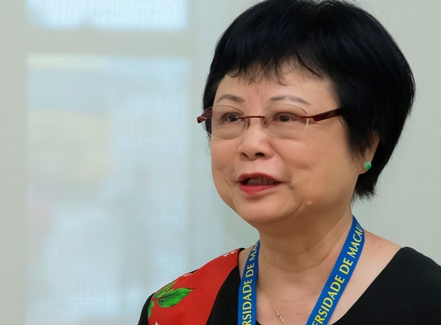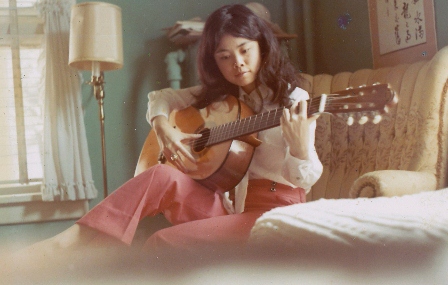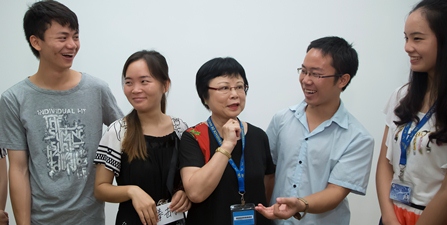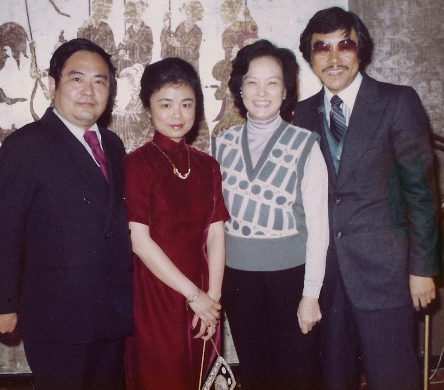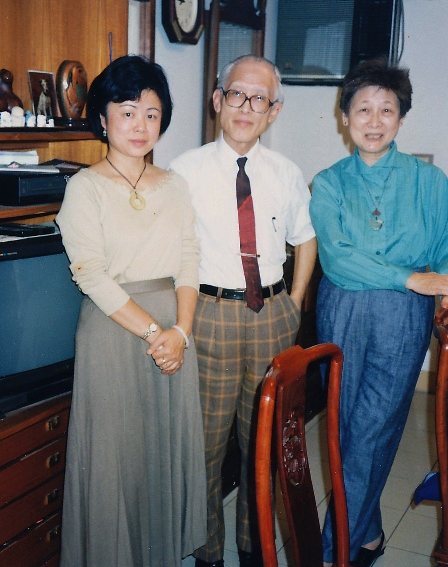Chung Ling was born in 1945, in Chongqing, China. Because her father was a military officer with the Republic of China’s Embassy in Japan, she travelled to Japan with her parents at the age of three. In 1950 her family moved to Taiwan, where they eventually settled in Kaohsiung. After graduating from the Department of Foreign Languages and Literature, Tunghai University, Chung Ling went on to pursue further studies in the Department of Foreign Languages and Literature at Taiwan University for one year. Later she received her master’s and PhD degrees in comparative literature from the University of Wisconsin—Madison, and then taught at the State University of New York. She married the well-known film director Hu Chin-chuan in 1977 and moved to Hong Kong, dividing her time between Hong Kong and Taiwan amid her many roles in teaching, administration and writing. Earlier this year she joined the University of Macau (UM) as college master.
Falling In Love with Literature—and the Film Director
Now a renowned poet and fiction writer, Chung Ling began to publish her own articles when she was still in high school, which was thanks to her uncle who, himself a book lover, often bought Chung Ling the Chinese translations of western classics such as Pride and Prejudice and Le Comte de Monte-Cristo. At age 15, Chung Ling stumbled upon a complete collection of The Tale of the Swordsman in Shu Shan by Li Shanji in her father’s boss’s home. Finding the story utterly irresistible, she borrowed the collection which included more than 100 volumes, and having some spare time because of being exempted from the senior high school entrance examination, she finished all of them. “That fantasy world depicted in the novel was vastly different from the world I was in—in that world anything could happen,” recalls Chung Ling. “It re-conceptualised my perception of time and space. It was extremely imaginative and it played a seminal role in my later works. Many of the fantasy scenes in my later novels are borrowed from it.”
In college she read Kenneth Pai Hsien-yung, Wang Wenxing, and a number of other Taiwanese writers. She also continued with her own writing. To this day she has published a dozen short story collections and books of poetry. Talking about her writing style, Chung Ling admits that she has a penchant for writing about ancient times, which she attributes to the influence of The Tale of the Swordsman in Shu Shan, but she says she also likes to write about women. Take her Portraits of the Beauties, a poetry series, for instance. In this series she wrote in the first person about many famous females in Chinese history. “I wrote about Xi Shi, Wang Zhaojun, Tang Wan (the wife of the poet Lu You), Su Xiaoxiao, Wu Zetian, and so on,” says Chung Ling. “I tried to imagine, from a modern woman’s point of view, what it would be like to live in the ancient times as these women, to feel the pressure they had felt.” In Cross Over she told the story of a modern woman who time-travelled back to the Nanyue Kingdom. “In this book, I was also trying to imagine how a modern woman would feel if she suddenly found herself back in ancient China and entangled in the complexities of political conflicts and emotions like love, hate and revenge.”
It’s tempting to expect that a well-known fiction writer who has written many fascinating stories that have stretched the readers’ imagination time and time again would probably disagree with the saying that, “Truth is stranger than fiction”, for after all what could be so strange in real life as to surprise a creative writer? But interestingly, the beginning of Chung Ling’s love story with the famous film director Hu Chin-chuan was indeed one for the books. It all started when she was still teaching at the State University of New York at Albany. One day in a Chinese literature class, an American student told Chung Ling that the Chinese director who had just won an award at the Cannes Film Festival (editor’s note: Hu Chin-chuan was awarded a grand prix at the Cannes Film Festival in 1975 for his film A Touch of Zen) was in New York at the moment, and asked what Chung Ling thought about inviting him to give a lecture. Chung Ling liked the suggestion and tried to contact Hu. Not only did that lecture turn out to be a great success, but Chung and Hu hit it off immediately. Several nights later, Chung Ling was surprised by a phone call from Hu, who said out of the blue, “Chung Ling, marry me!”
What was Chung Ling’s response then? “I was absolutely dumbfounded,” recalls Chung Ling. “And I said to him how about I come to New York to meet you?” Chung admits that she too admired Hu’s talent. “His works are one of a kind,” says Chung. “What distinguishes his works from the works of others is this rich flavour of Chinese culture, the same way an intellectual stands out from the average person because of the aura of intellect.” Chung later learned that Hu’s call was made during a dinner in response to a dare from his friends who knew he felt attracted to Chung. Emboldened by alcohol, he called, and the rest is history.
New Relationship with UM Long after the Honeynoon
From Taiwan to the United States to Hong Kong, Prof. Chung has been to many places in the world. Why did she choose to join UM? “I’ve known Prof. Haydn Chen, the vice rector at UM, for a long time,” says Chung Ling. “He is very dedicated to education, which I admire very much and which has influenced me deeply.” Chung says she strongly identifies with Haydn’s residential college concept. “And what’s more important, he gives me and the other college masters a lot of freedom to decide how we want to develop a distinctive character and a unique style for our residential colleges, as well as how we plan to help our students mature over a course of four years,” says Chung Ling. “I think this is an amazing opportunity—to influence young people during the final phase in their character development in a positive and meaningful way.”
So what’s Prof. Chung’s vision for the residential college she is in charge of? “I hope our residential college is like a warm home where I, the associate master, fellows, and the tutor team comprised of upperclassmen, make the students feel loved and cared about,” says Chung. “Also, we will organise various kinds of activities like workshops, talks and films to help the students know more about traditional Chinese culture, history and literature.”
Chung plans to have different educational foci for students from mainland China and students from Macao to meet their different needs. “For example, because most of the students from mainland China are the only child in their families due to the ‘One Child’ policy and thus grew up in an overly indulgent environment, they need to learn to be less self-absorbed and to think more about others and care about society,” notes Chung Ling. “Whereas students from Macao need to be exposed to a different set of values, especially values about money, to prevent the ubiquitous presence of casinos and the prevalent gambling practice in Macao from insidiously implanting the ‘Money Is Everything’ materialism in them. I know a very accomplished historian, who is an intellectual with a great sense of mission. He used to be the managing director of a large company. I could invite him over to give a talk to our students. I think there is a lot our students can learn from him. And this is just one example of the kind of things we can do.”
Prof. Chung’s ties with Macao date back to 1977—that was when she first visited this city on a honeymoon with her new husband Hu. Now it’s been 30 years, and how much has Macao changed compared to the one in her memory? “The place has changed a lot for sure, but what has stayed the same are the friendliness and the joy of the people here,” remarks Chung. “Everyone I’ve seen here, no matter what they do, just seems genuinely happy.” A lover of nature, Prof. Chung says she’s been to Coloane once and it has left a very deep impression on her.
An early riser, Chung Ling normally gets up at six to write for about one hour and a half before she sets to work. But she has to suspend this early morning routine for a while because there is so much to prepare for the new residential college. “There are a lot of things to do. Every day when I get home I’m too tired to write,” says Chung. “And every morning when I get up, I’m too preoccupied with the work about the new college to write either. So maybe I’ll resume writing when the college is on the right track.” Prof. Chung discloses that she is writing a long novel, but she isn’t entirely happy with the beginning, so she is thinking about starting again from scratch. If you are a fan of her books, you may have to hold your breath a little longer before having the pleasure of diving into her next book.
Recommended Book and Film from Prof. Chung
Fatigue Beyond Life and Death by Mo Yan
Fatigue Beyond Life and Death by Mo Yan, published in 2006, depicts the changes of the countryside in China over a course of 50 years from 1950 to 2000. Prof. Chung thinks one of the most important aspects of any fiction book is readability, and she thinks this book is very humorous and entertaining.
Dragon Gate Inn by Hu Chin-chuan
Dragon Gate Inn, written and directed by Hu Chin-chuan, was screened in Taiwan in 1967. Prof. Chung says if one wants to find a film that best represents the spirit of chivalry in ancient China, he or she need not look further than the Dragon Gate Inn. What’s more, the director integrates the moves of Peking Opera into martial arts, giving the film a new style similar to that of modern dances.

